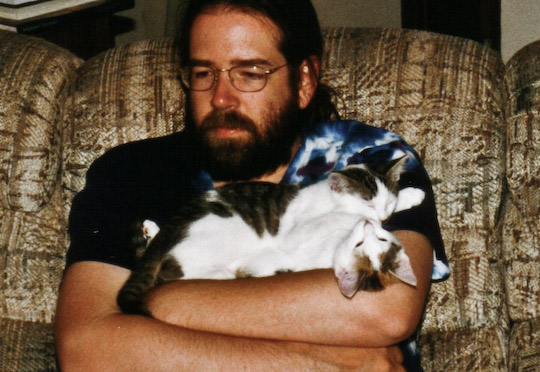 Sixth in Rusch’s Retrieval Artist series. I started with the third book which worked okay, but I wouldn’t recommend starting with this one. There’s just too much back story taken as given. New in this volume is a second primary point of view character (at least I don’t remember the narrative being this split in the other books). We meet a young woman named Talia Shindo whose mother is kidnapped from their home on Jupiter’s moon Callisto by a Recovery Man early in the book. Actually there are several other POV characters too now that I think about it, so maybe I’m misremembering the other books as staying closer to Miles Flint.
Sixth in Rusch’s Retrieval Artist series. I started with the third book which worked okay, but I wouldn’t recommend starting with this one. There’s just too much back story taken as given. New in this volume is a second primary point of view character (at least I don’t remember the narrative being this split in the other books). We meet a young woman named Talia Shindo whose mother is kidnapped from their home on Jupiter’s moon Callisto by a Recovery Man early in the book. Actually there are several other POV characters too now that I think about it, so maybe I’m misremembering the other books as staying closer to Miles Flint.
The setting of these novels has human culture interacting with a large number of alien species. In these interactions, humans become subject to alien laws. These laws are sometimes viewed by humans as trivial or incomprehensible, so humans created Disappearance Services which are like a witness relocation program on steroids: the offending person is given a new identity and hidden away so the affronted aliens cannot exact their punishment (usually death). Humans being the opportunists that they are, a parallel occupation springs up called a Tracker. Trackers will find disappeared people for the alien governments. They’re not very well liked. Retrieval Artists are like human-sympathetic Trackers, they will find a disappeared person, but only under circumstances where that person would presumably want to be found (e.g., when the violated law changes and their offense is no longer fatal to them, or when they suddenly come into a large sum of money.) Those three occupations were in all the previous books. In this book, Rusch introduces a new one. A Recovery Man is someone with the quasi-legal job of returning wayward possessions to their rightful owners. And yes, the word “possession” there does denote that people are a bit out of the Recovery Man’s normal line.
Meanwhile back on our moon, Miles Flint is still working through the revelations from the previous book, Paloma where he found that his mentor wasn’t the ethical pillar he’d thought she was, and in particular he discovers that some of her transgressions may have involved Miles himself.
The major plot points in this book build off events from previous books in a way that feels a little flimsy, like it didn’t occur to Rusch that this might have been what really happened behind the scenes until now. But while those points strain credulity a bit, the execution of the new story line is good enough, and the newly revealed characters interesting enough that I can forgive her. It can’t be easy to maintain a series whose books each hinge on personally life-changing events for the main character. If a little retconning is required, at least it results in an interesting story.
I’m a little worried about the next book, though. It could easily stray into the territory of cop buddy movie cliche (actually a subgenre of that, but I can’t tell you which one without spoiling this book) if she’s not very careful.
 Pi is a young boy who finds himself in a lifeboat after the ship carrying his zoo-keeper family from India to Toronto is sunk in the South Pacific. Complicating matters somewhat is the fact that he is sharing the lifeboat with a full-grown Bengal tiger.
Pi is a young boy who finds himself in a lifeboat after the ship carrying his zoo-keeper family from India to Toronto is sunk in the South Pacific. Complicating matters somewhat is the fact that he is sharing the lifeboat with a full-grown Bengal tiger. This is the second book Walton has set in an England which made peace with Hitler’s Germany. Inspector Carmichael of Scotland Yard is again one of the point of view characters. He trades chapters with a new character, Viola Lark who, on the first page of the book, is offered the lead in a gender-swapped production of Hamlet.
This is the second book Walton has set in an England which made peace with Hitler’s Germany. Inspector Carmichael of Scotland Yard is again one of the point of view characters. He trades chapters with a new character, Viola Lark who, on the first page of the book, is offered the lead in a gender-swapped production of Hamlet.

 Sixth in Rusch’s Retrieval Artist series. I started with the third book which worked okay, but I wouldn’t recommend starting with this one. There’s just too much back story taken as given. New in this volume is a second primary point of view character (at least I don’t remember the narrative being this split in the other books). We meet a young woman named Talia Shindo whose mother is kidnapped from their home on Jupiter’s moon Callisto by a Recovery Man early in the book. Actually there are several other POV characters too now that I think about it, so maybe I’m misremembering the other books as staying closer to Miles Flint.
Sixth in Rusch’s Retrieval Artist series. I started with the third book which worked okay, but I wouldn’t recommend starting with this one. There’s just too much back story taken as given. New in this volume is a second primary point of view character (at least I don’t remember the narrative being this split in the other books). We meet a young woman named Talia Shindo whose mother is kidnapped from their home on Jupiter’s moon Callisto by a Recovery Man early in the book. Actually there are several other POV characters too now that I think about it, so maybe I’m misremembering the other books as staying closer to Miles Flint.


 A friend was reading Russell’s The Sparrow for a book group which reminded me that we had this book on the shelf. This one isn’t science fiction, but instead a historical novel set in Northern Italy towards the end of World War II.
A friend was reading Russell’s The Sparrow for a book group which reminded me that we had this book on the shelf. This one isn’t science fiction, but instead a historical novel set in Northern Italy towards the end of World War II.
 Becky read about this book somewhere and got it from the library then failed to read it. She suggested I take a look at it and I read it. Then it sat around the house for another few weeks after it couldn’t be renewed any longer accruing overdue fines while I caught up on my backlogged book reviews. I couldn’t review it out of order, you see. Sucks to be compulsive.
Becky read about this book somewhere and got it from the library then failed to read it. She suggested I take a look at it and I read it. Then it sat around the house for another few weeks after it couldn’t be renewed any longer accruing overdue fines while I caught up on my backlogged book reviews. I couldn’t review it out of order, you see. Sucks to be compulsive.